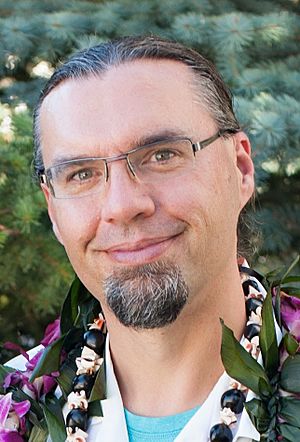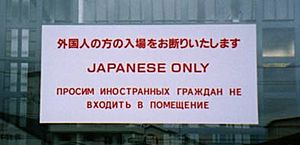Debito Arudou facts for kids
Quick facts for kids
Debito Arudou
|
|
|---|---|

Debito Arudou in 2014
|
|
| Born |
David Christopher Schofill
January 13, 1965 California, United States
|
| Nationality | Japanese |
| Other names | David Christopher Aldwinckle, Sugawara Arudōdebito, Debito Beamer |
| Alma mater |
|
| Known for | Human rights activism |
Debito Arudou (born David Christopher Schofill on January 13, 1965) is a writer, blogger, and human rights activist. He was born in the United States. In 2000, he became a Japanese citizen. This means he went through a process called naturalization. Arudou lived in Japan for over 20 years before moving away. He is known for working to make sure everyone is treated fairly.
About Debito Arudou
His Early Life and Education
Debito Arudou was born David Christopher Schofill in California in 1965. He grew up in Geneva, New York. In the 1970s, his stepfather adopted him. His name then changed to David Christopher Aldwinckle.
He went to Cornell University and finished in 1987. During his last year, he studied Japanese. This was after he visited his pen pal, who would later become his wife, in Japan. Aldwinckle then moved to Japan for a year. He taught English in Sapporo, Hokkaido. After that, he spent a year at the Japan Management Academy. This was in Nagaoka, Niigata Prefecture. He then returned to the U.S. to get his Master's degree. He studied at the University of California, San Diego (UCSD).
In 1993, Arudou started teaching at Hokkaido Information University. This is a private university in Ebetsu, Hokkaido. He taught business English and debate classes. He was a professor there until 2011. From 2012 to 2013, Arudou worked at the East–West Center in Honolulu, Hawai'i. He earned his PhD in International Studies in 2014. This degree was from Meiji Gakuin University.
His Family and Becoming a Japanese Citizen
Aldwinckle married a Japanese citizen in 1989. They have two daughters together. In 1996, he became a permanent resident of Japan. This meant he could live there for a long time.
In 2000, he became a naturalized Japanese citizen. When he became Japanese, he changed his name. He took his wife's family name, Sugawara. His full name became Arudoudebito Sugawara. He and his wife divorced in 2006.
His Work for Human Rights
Debito Arudou is well-known for his work as a human rights activist. He has spoken out against unfair treatment. He believes everyone should have the same rights.
The "Japanese Only" Lawsuit
In the late 1990s, Arudou noticed something unfair. Three bathhouses in Hokkaido, Japan, had signs. These signs said "No Foreigners" or "Japanese Only." Arudou felt this was wrong.
He gathered a group of 17 people. They were from different countries. This group tried to enter the Yunohana bathhouse in Otaru. They wanted to see if the "No Foreigners" rule was real. The group tried to enter twice. Both times, they were not allowed in.
In October 2000, Arudou went back to Yunohana. This time, he was a Japanese citizen. But he was still refused entry. The manager said Arudou looked foreign. They worried his appearance would make Japanese customers leave. The bathhouse had closed before due to foreign visitors. They wanted to prevent this from happening again. So, they refused entry to anyone who looked like a foreign national.
In February 2001, Arudou and two others sued the bathhouse company. They said it was racial discrimination. They also sued the City of Otaru. They said the city broke a United Nations treaty. This treaty is about stopping racial discrimination. Japan had agreed to this treaty in 1996.
On November 11, 2002, the court made a decision. It ordered the bathhouse company to pay money to Arudou and the others. The court said refusing all foreigners was unfair. It was an illegal act. The court also said the city of Otaru did not have to create an anti-discrimination law. The court felt this was up to the city. The higher courts later agreed with these decisions.
Other Protests and Actions
Arudou has taken part in other protests too. He often speaks up for foreign residents in Japan.
Protesting for Residency Rights
In 2003, Arudou and other foreign residents dressed as seals. They were protesting a special honor. An honorary jūminhyō was given to a seal named Tama-chan. A jūminhyō is like a residency registration. The protesters said if animals could get this, foreigners should too. At that time, non-Japanese residents had a separate registration system. They felt this was unfair.
Speaking Out Against Negative Media
In February 2007, Arudou protested a magazine. The magazine was about crimes by foreigners. Arudou called it "ignorant propaganda." He said it only showed bad things foreigners did. It did not mention crimes by Japanese people. Arudou wrote a letter for people to take to stores. The letter protested discrimination against non-Japanese residents.
Challenging Police Stops
In June 2008, Arudou complained to the police. He said officers were stopping foreigners more often. This was before a big meeting in Hokkaido. Arudou had been stopped by police. He said he did not have to show ID. He then met with police leaders. He held a press conference about the issue.
Protesting Stereotypes in Advertising
In August 2009, Arudou led a campaign. He protested a McDonald's Japan advertisement. It featured a character called Mr. James. Mr. James was an American who loved McDonald's. He spoke Japanese in a funny way. Arudou said the ad showed negative stereotypes. He asked McDonald's to remove the advertisement. He felt it made fun of non-Japanese people in Japan.
See also
- Ethnic issues in Japan
- Naturalization
- Yamato people


